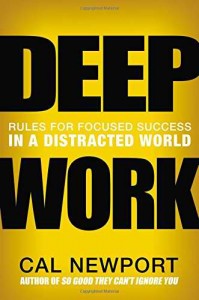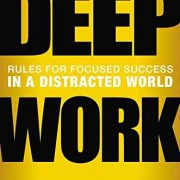“Deep Work” rules to help you write more
Many people struggle to write as much as they’d like. This is especially true if the writing isn’t a core part of your job. I found some rules that may help you when I read Deep Work: Rules for Focused Success in a Distracted World by Cal Newport.
What is “deep work”?
 Here’s how the author defines “deep work”:
Here’s how the author defines “deep work”:
Professional activities performed in a state of distraction-free concentration that push your cognitive capabilities to their limit. These efforts create new value, improve your skills, and are hard to replicate.
It’s clear to me that writers will benefit from this kind of concentration. How do you achieve it? One way is to develop rituals that signal to you that it’s time to focus.
I suggest that you create rules to answer the questions that Newport says must be addressed by an effective deep work ritual.
Rule 1. Pick a location for your deep work
Newport asks you to pick a location for your deep work. As he says, “If it’s possible to identify a location used only for depth—for instance, a conference room or quiet library—the positive effect can be even greater.” But you might be able to get away with working in your usual work place if you can set other rules to help you focus.
I think that being in a different location is one reason why I’ve been so successful with blogging on vacation, as I discussed in “No batteries required: My favorite blogging technique.” When I’m not on vacation, I do most of my blog post writing either on steno pads, which I can use anywhere, or at my PC, which plunks me down in my office.
Rule 2. Pick a length of time for your deep work
“…give yourself a specific time frame to keep the session a discrete challenge and not an open-ended slog,” says Newport.
I have tried a variation on this by committing to work for a minimum of 15 minutes, as I discussed in “15 minutes to busting your writer’s block.” I haven’t tried putting a limit on how long I can work. That simply hasn’t been a problem for me. However, I can see how it would help some people to know that they need not continue working beyond their predetermined limit.
Rule 3. Limit distractions during your deep work
For example, this could mean closing email and blocking social media during your deep work.
Rule 4. Support yourself
Newport says this could mean you “start with a good cup of coffee.” It also means creating an environment that supports your work by keeping necessary supplies handy. Newport says, “…this support needs to be systematized so that you don’t waste mental energy figuring out what you need in the moment.”
I love Newport’s line about “…don’t waste mental energy figuring out what you need in the moment.” I think that’s one of the biggest benefits of any rituals or systems that help you to write.
For me, the support for my blogging means having a handy list of potential blog post topics so I never have to start from scratch.
For some writers, it might mean always starting from the most recent stopping point in your work, as I discussed in “Break your writer’s block with Robert Benson and Eric Maisel.”
What rules help you to do deep work?
If you’re achieving deep work, what rules work for you?






Susan, great points. In the struggle to “focus” I found the Pomodoro system helpful. It does break the working time into 25 minutes w/ 5 min or 15 breaks, which may sound too short. It isn’t IF one plans a whole block ahead, for instance 2, 3 or 4 hours – or the whole day. The planning ahead is crucial, and the most difficult part. The breaks act like nice rewards and gets one moving. Again, planning ahead is required to make it work, along with the helpful recommendations you listed.
Hi Katharina, it’s great to hear from you. Other friends have also told me they like the Pomodoro system helpful. I sometimes use a 15-minute timer to get me started on tasks that I’ve been avoiding.